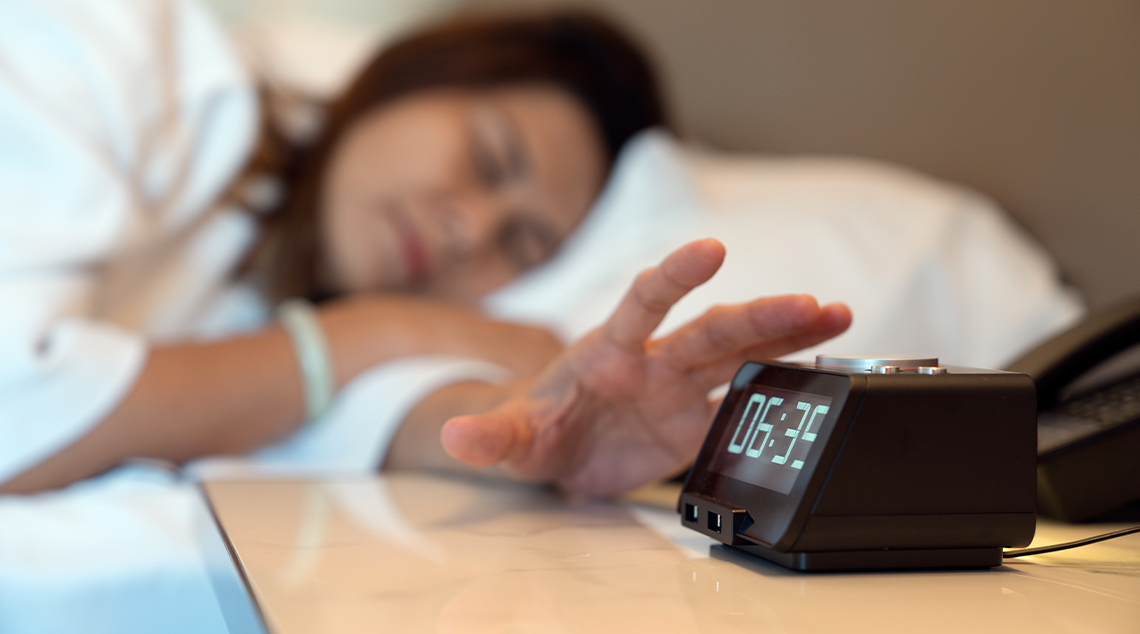What hitting the snooze button is really doing to your health
Using your alarm’s snooze button in the morning might not be as bad as previously thought – provided you use it the right way.
Recent research suggests that, rather than leaving you feeling drowsy, hitting the snooze button a few times in the morning might actually have the opposite effect.
In the study, one group of people were instructed to get up as soon as their alarms went off, while another group was allowed to hit snooze a few times after their first alarm sounded.
The results showed that snoozing for half an hour either improved or didn’t negatively impact performance on cognitive tests undertaken as soon as they got up, compared to waking up abruptly.
One theory is that snoozing prevents awakening from slow-wave sleep.
“The findings indicate that there is no reason to stop snoozing in the morning if you enjoy it, at least not for snooze times around 30 minutes,” lead researcher Tina Sundelin, from Sweden’s Stockholm University, says.
“In fact, it may even help those with morning drowsiness to be slightly more awake once they get up.”
How to use the snooze button to your advantage
It pays to know that the research didn’t involve sleeping in for 30 minutes longer.
Instead, people in the snooze group were instructed to set their initial alarm for 30 minutes before they had to get up.
It’s an important detail, given other research shows sleeping in, even on weekends, can be counterproductive.
While one study found weekend sleep-ins aren’t effective for making up for weekday sleep loss, other research shows they can contribute to something called social jetlag, where your body’s circadian rhythm or internal clock doesn’t match the reality of your daily schedule.
“If you sleep in later, perhaps because you went to bed late, you can start pushing your circadian rhythm out, delaying your sleep-wake phase,” sleep practitioner and Nigh Nigh sleep consultancy founder Deb Herdman explains.
“If you’re able to sleep in all the time this can then become your new norm,” Deb says.
“But if after a few days, you have to get up early again to go to work for example, that’s where you can find it difficult to fall asleep at a time that ensures you’ll get sufficient sleep before your alarm goes off.
“And then when it does, you’ll wake up feeling tired in the morning because you haven’t had enough sleep.”
Plus, feeling groggy might not be the only effect of social jetlag.
It’s also been linked to a higher risk of type 2 diabetes, cardiovascular disease and Alzheimer’s.
It may even encourage the growth of harmful gut bacteria.
The bottom line – to snooze or not to snooze?
While the snoozing study showed snoozers who set their first alarm to sound 30 minutes early only lost about six minutes of sleep, Deb suggests being cautious.
“Adjusting your alarm to an earlier time so you get to enjoy snoozing may impact your overall sleep time,” she says.
As for snoozing to sleep in, Deb says maintaining regular go-to-sleep and wake-up times is a good idea for most of us.
“Going to bed and getting up at the same time is good advice to help people who are typically good sleepers, maintain their sleep, thanks to the way it helps keep the circadian rhythm in check,” she says.
“But it’s important to note that people who experience insomnia usually need specific therapies to help solve problems with delayed sleep, where they take longer than 30 minutes to fall asleep or they wake frequently or too early.
“So if you’re having trouble with your sleep and you try regulating your sleep and wake times and nothing changes, see a sleep professional.”
Need more Z’s? Read more on sleep:
- Sleep SOS: How to stop night sweats ruining your sleep
- Is everything you thought about blue light and sleep wrong?
- How coloured noise could help you sleep
- Inside the fascinating world of sleepwalking
Written by Karen Fittall.






